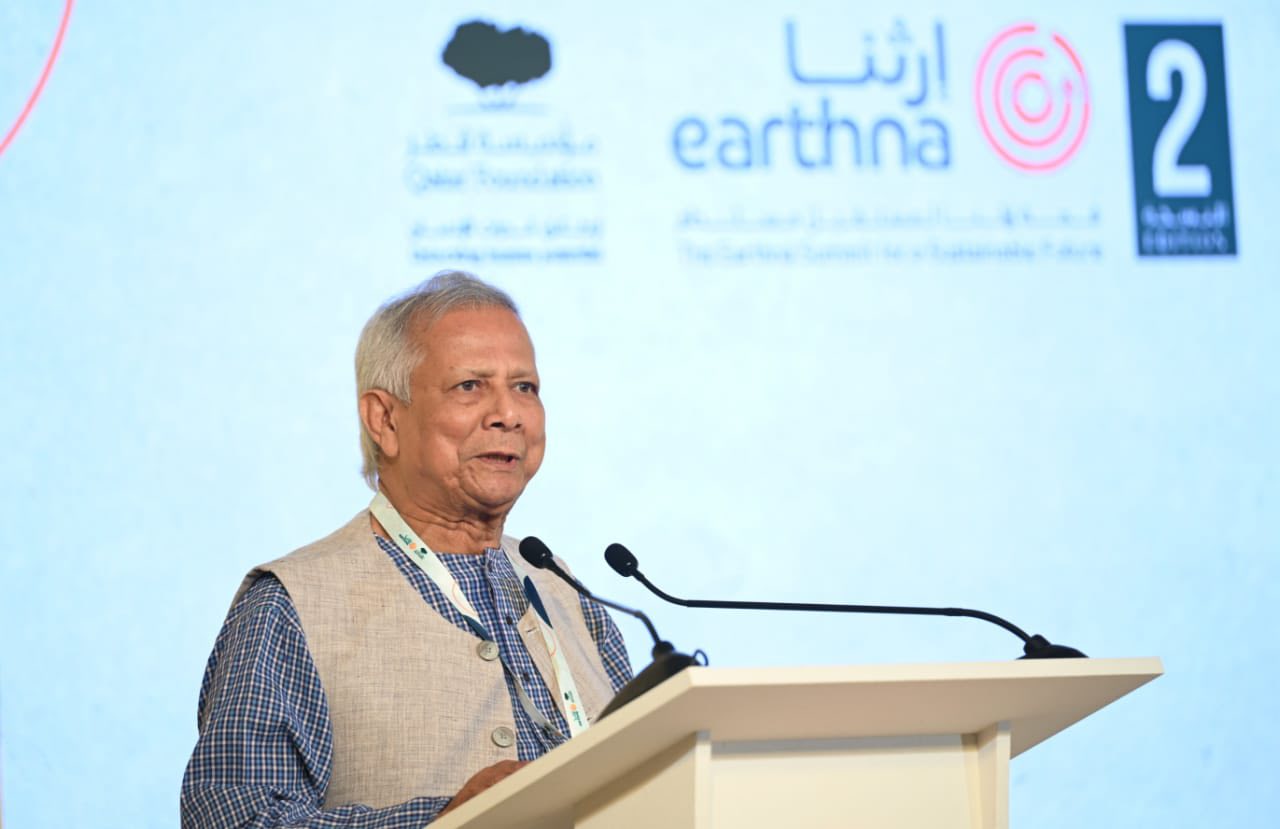News Flash
News Flash

DOHA (Qatar), April 22, 2025 (BSS) - Claiming that social business can bring millions of people out of poverty, Chief Adviser Professor Muhammad Yunus today said poverty is created due to a wrong economic system.
"We are aware that poverty is not created by poor people. It is a consequence of an economic system where resources surge upwards, concentrating wealth ever more narrowly," he said.
Prof Yunus made the remarks while delivering his keynote speech on 'Exploring the role of social business, financial inclusion, and microfinance in fostering sustainable development and economic opportunities for marginalised communities' at Earthna Summit, organised by Qatar Foundation, in Doha, Qatar.
He said social business armed with the power of financial inclusion can break free of this trap and can move millions out of poverty.
"Today, I will share the firsthand experiences of the power of two interrelated innovative approaches of social business and microcredit that have uplifted marginalised communities in my own country," he said.
In Bangladesh, the chief adviser said microcredit model showed that even the poorest individuals are creditworthy.
By offering small, collateral-free loans, microcredit empowers individuals to build livelihoods, generate income, and lift themselves and their families out of poverty, he said.
The Grameen Bank founder said microcredit has a strong track record of success, most notably through the pioneering work of Grameen Bank in Bangladesh.
Founded on trust, he said the bank provided collateral-free microloans to poor villagers, especially women.
It has empowered over 300 million people globally by unlocking their entrepreneurial potential, he mentioned.
Prof Yunus said Grameen Bank itself lends over US$ 2.5 billion annually to 9 million women with a remarkable repayment rate of nearly 99%.
He said this model has been successfully replicated in various countries, including the United States through Grameen America, while over US$ 600 million in loans was provided to over 86,000 low-income women with a repayment rate exceeding 99%.
The chief adviser said stories of entrepreneurs like Damaris in Boston expanding her restaurant and Reyna in Texas growing her boutique exemplify the transformative impact of microcredit.
Furthermore, he said platforms like Kiva have facilitated over US$ 960 million in loans by connecting individual lenders with entrepreneurs in 82 countries.
Another transformative force in the pursuit of a more inclusive and sustainable world is social business, he said, adding that arising from the experiences of Grameen Bank, numerous social businesses have addressed critical issues.
Prof Yunus said Grameen Danone Foods provides fortified yogurt to malnourished children in Bangladesh, while Grameen Euglena produces nutritious cookies and supports local farmers.
Social business has fostered ventures like Golden Bees in Uganda, connecting small farmers to markets, and Impact Water, providing safe drinking water in Ugandan schools, he mentioned.
Globally, the chief adviser said Human Harbor Corporation in Japan tackles waste recycling and employs ex-prisoners, and joint ventures like Campo Vivo in Colombia and Bon et Bien in France address poverty and food waste in collaboration with major corporations.
He said the increasing number of social business funds and the growing interest from corporations and young entrepreneurs worldwide signify the expanding impact and potential of this model to create sustainable solutions for societal challenges.
"I am hopeful that these combined initiatives will help us to achieve the target of three zeroes- zero poverty, zero unemployment, and zero net carbon emissions. This is not a utopia. It is a vision rooted in what I have witnessed firsthand. And I sincerely hope they will lead to the path of fourth zero - zero waste."
He said zero waste is a philosophy and a practical approach aimed at eliminating waste - not just managing it.
Prof Yunus said the goal is to design and use products and processes that minimise the generation of waste and ensure that all materials are reused, recycled, or composted rather than sent to landfills or incinerators.
He said this approach not only protects the environment by reducing pollution and conserving natural resources but also promotes sustainable production, ethical consumption, and economic efficiency.
By adopting this policy, individuals, businesses, and governments can significantly lower their environmental footprint and move toward a cleaner, greener, and more sustainable future, he said.
"However, in this endeavor, we must not forget the importance of traditional learning and cultures. It has often been noted that on many occasions traditional solution provides the best cure for many modern problems," the chief adviser said.
"Hence, all our endeavors for ensuring a sustainable future for everyone need to build on the traditional knowledge and culture to ensure its sustenance," he added.
Sheikha Moza bint Nasser, Chairperson of Qatar Foundation, and Sheikha Hind bint Hamad Al Thani, Vice Chairperson and CEO of the Qatar Foundation, were present at the summit, among other, global leaders.